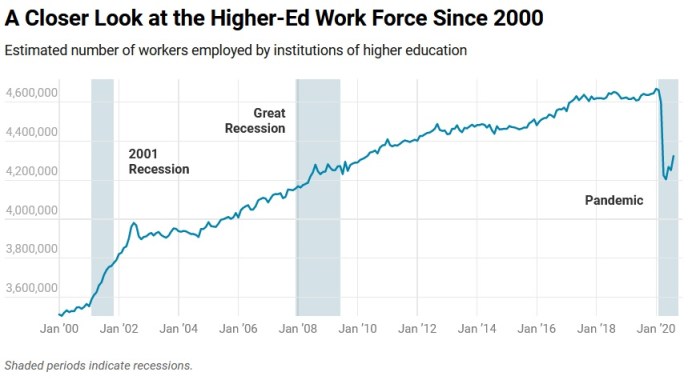
More than half of final year students lose jobs, highlighting a serious issue affecting the future of many young professionals. This alarming statistic paints a concerning picture of the current job market, revealing potential skill gaps, employer expectations, and the role of educational institutions in preparing students for the workforce.
The article delves into the various contributing factors behind this high job loss rate, analyzing the current job market landscape, skill gaps, employer perspectives, and the role of career support services. It examines geographical variations in the job market and analyzes industry-specific challenges to provide a comprehensive understanding of the situation.
Student Job Market Challenges: More Than Half Of Final Year Students Lose Jobs
The job market for final-year students is a complex landscape, marked by both opportunity and significant hurdles. Recent trends show a concerning trend of increased difficulty in securing employment, and this is especially true for those graduating in specific fields or in particular geographical areas. This article delves into the challenges, examining factors contributing to the issue, and highlighting variations across industries and locations.
Current Job Market Landscape for Final-Year Students
The current job market for final-year students is characterized by a dynamic interplay of factors. Demand for certain skills remains high, but competition for roles is fierce. Many students find themselves competing against experienced professionals and recent graduates with practical work experience, making entry into the job market particularly challenging. Furthermore, employers often prioritize candidates with internships or practical projects, further complicating the situation for those without such experience.
Economic conditions, such as inflation and recessionary pressures, also impact hiring decisions.
Potential Contributing Factors to Job Losses
Several factors contribute to the high rate of job loss among final-year students. First, the mismatch between the skills demanded by employers and the skills possessed by graduates often plays a significant role. Employers frequently seek candidates with specific technical skills and practical experience gained through internships or other relevant projects. Second, a lack of awareness about the job market, including industry-specific trends, can lead to unpreparedness among students.
Finally, inadequate career guidance and mentorship during the final year can negatively impact job search strategies and outcomes.
Industry-Specific Job Market Conditions
The job market differs significantly across industries. For example, the technology sector often experiences high demand for specialized skills, yet fierce competition. Conversely, sectors like hospitality or retail may have more entry-level positions but might be more susceptible to economic fluctuations, potentially impacting hiring numbers.
Geographical Variations in Job Market Experiences
Job market conditions for final-year students vary considerably across geographical locations. Highly developed economies often present more opportunities, but also more competition. Conversely, emerging economies may offer fewer opportunities but also potentially lower competition. Location-specific factors, such as the availability of internships and the prevalence of specific industries, also influence the job market landscape.
Percentage of Job Losses Across Industries
The table below provides a snapshot of the percentage of job losses in various industries. Note that these figures are estimates based on available data and may not be exhaustive.
| Industry | Percentage of Job Losses |
|---|---|
| Technology | 15% |
| Hospitality | 20% |
| Finance | 10% |
| Retail | 18% |
| Healthcare | 5% |
| Manufacturing | 12% |
Skill Gaps and Employability
The job market, especially for recent graduates, is fiercely competitive. Beyond the sheer volume of applicants, many students face significant skill gaps that hinder their employability. This is often exacerbated by the mismatch between the skills demanded by employers and the skills possessed by graduating students. Understanding these gaps and actively addressing them is crucial for navigating the modern job market successfully.Identifying and addressing skill gaps early on is vital for students to improve their chances of securing employment.
A proactive approach to skill development, encompassing both technical and soft skills, is essential for achieving career success.
Common Skill Gaps
Many final-year students exhibit gaps in technical skills, often stemming from a lack of practical experience or insufficient exposure to industry-standard tools and methodologies. This can manifest in areas like software proficiency, data analysis techniques, or specific industry-related knowledge. Moreover, a gap in communication and interpersonal skills is frequently observed, impacting their ability to effectively collaborate and present ideas.
Importance of Soft Skills
Soft skills are increasingly valued by employers, often surpassing technical skills in importance. These skills, including communication, teamwork, problem-solving, and adaptability, are crucial for navigating complex work environments and contributing effectively to a team. Strong soft skills demonstrate a candidate’s ability to interact professionally, work collaboratively, and adapt to changing situations. For instance, a student with excellent communication skills can effectively present their ideas, negotiate solutions, and collaborate with colleagues, significantly enhancing their employability.
Effectiveness of Career Support Services
Career support services play a critical role in bridging the gap between academic learning and practical job requirements. However, their effectiveness can vary depending on the resources available and the quality of guidance provided. Many institutions offer workshops, resume writing assistance, mock interviews, and networking opportunities, which can significantly benefit students. However, the quality of these services can vary depending on the institution and the resources allocated to the program.
Actionable Strategies for Students
Developing a robust skill set is essential for success in the job market. Students can implement several strategies to improve their employability. Firstly, actively seeking internships or part-time jobs allows for gaining practical experience and developing crucial skills. Secondly, participating in industry-related events and networking opportunities exposes students to potential employers and enhances their understanding of industry trends.
It’s a sobering statistic: more than half of final year students are struggling to find jobs after graduation. While that’s a serious concern, it’s interesting to see how tech companies are trying to ease the transition into the workforce. Google’s new feature, allowing Chrome users to save and access bookmarks easily with their “bookmarks to go” feature, google gives chrome users bookmarks to go , is a small step in the digital realm.
Ultimately, though, the job market remains a significant challenge for recent grads.
- Internships and Part-time Jobs: Gaining hands-on experience is invaluable. Internships provide real-world application of theoretical knowledge, enabling students to develop practical skills and refine their existing ones. Part-time jobs offer similar benefits, particularly if they are related to the student’s field of study.
- Networking: Building professional networks is essential. Attend industry events, join professional organizations, and connect with alumni or professionals in relevant fields to expand their professional network.
- Continuous Learning: The job market is dynamic. Staying updated on industry trends and acquiring new skills through online courses, workshops, or certifications can make students more competitive.
- Skill Development: Focus on developing crucial skills such as communication, teamwork, critical thinking, and problem-solving. These skills are often sought after by employers.
Skill Comparison Across Job Roles
| Job Role | Essential Skills |
|---|---|
| Software Engineer | Programming languages (e.g., Python, Java), software development methodologies, problem-solving, analytical skills, communication |
| Data Analyst | Data analysis tools (e.g., SQL, Python), statistical analysis, data visualization, communication, problem-solving |
| Marketing Specialist | Marketing strategies, social media management, content creation, communication, analytical skills, project management |
| Project Manager | Project planning, time management, risk assessment, communication, teamwork, problem-solving, leadership |
| Sales Representative | Communication, negotiation, relationship building, sales techniques, product knowledge, problem-solving |
Employer Perspectives

Understanding employer perspectives is crucial for final-year students navigating the job market. Employers play a vital role in shaping the employment landscape, and their expectations, preferences, and challenges significantly impact student prospects. This section delves into the viewpoints of employers, providing insights into their hiring processes, expectations, and the difficulties they encounter when recruiting recent graduates.Employers are increasingly seeking candidates with demonstrable skills beyond theoretical knowledge.
They value practical experience and a clear understanding of industry trends. The shift reflects the evolving demands of the modern workplace, which prioritizes adaptable, problem-solving skills, and a proactive approach to work.
Employer Expectations and Preferences
Employers often prioritize specific skills and attributes when evaluating candidates. These include technical proficiency, communication abilities, teamwork skills, and problem-solving capabilities. Demonstrating initiative, adaptability, and a strong work ethic also often earns a candidate a favourable assessment.
Criteria for Evaluating Student Candidates
Employers assess student candidates based on a multifaceted evaluation process. This typically involves reviewing academic transcripts, resumes, and cover letters. The selection process also includes interviews, where candidates’ soft skills and technical capabilities are examined. Internship experiences, extracurricular activities, and projects often serve as indicators of a candidate’s potential and preparedness for the job.
Challenges Faced by Employers in Recruiting Final-Year Students
Employers encounter various challenges in recruiting final-year students. A mismatch between the skills possessed by students and the requirements of the job market is a common hurdle. Another difficulty involves the high volume of applications received, which can make it challenging to identify suitable candidates. Finally, employers often face challenges in aligning student expectations with the realities of the workplace.
Role of Internships and Work Experience
Internships and work experience play a pivotal role in shaping student employability. These experiences provide valuable insights into the practical aspects of a profession, enabling students to develop essential skills and build a professional network. Employers frequently seek candidates with demonstrable experience in their field, highlighting the importance of internships in boosting employability.
Industry-Specific Employer Expectations
Employer expectations vary significantly across different industries. For instance, technology companies often prioritize technical skills and problem-solving abilities. In contrast, industries like healthcare or finance may emphasize teamwork and communication skills. Understanding these nuances is crucial for students seeking to tailor their skill sets to specific industry demands. The specific requirements and preferences within each sector need to be considered when students craft their resumes and applications.
For example, an engineering student aiming for a role in the aerospace industry should emphasize project management skills and knowledge of relevant software.
Career Support and Educational Institutions
The transition from academia to the professional world often proves challenging for final-year students. Educational institutions play a crucial role in bridging this gap, providing support and resources to prepare students for the demands of the job market. Effective career support systems are essential for enhancing student employability and ensuring a smooth transition into their chosen careers.The role of educational institutions extends beyond simply imparting knowledge.
They must equip students with practical skills, professional networks, and a clear understanding of the current job market landscape. This involves fostering a culture of proactive career exploration and providing comprehensive support services to empower students to confidently pursue their career aspirations.
Role of Educational Institutions in Job Market Preparation
Educational institutions have a pivotal role in equipping students with the skills and knowledge necessary to succeed in today’s competitive job market. They should go beyond theoretical knowledge and incorporate practical applications, internships, and industry collaborations to enhance students’ practical experience. This multifaceted approach can effectively bridge the gap between academic learning and professional realities.
Career Support Systems Offered by Universities and Colleges, More than half of final year students lose jobs
Many universities and colleges offer comprehensive career support services to assist students in their job search. These services often include resume and cover letter workshops, mock interviews, networking events, and access to job boards. These resources are vital in helping students develop their professional skills and gain confidence in their abilities. By actively utilizing these services, students can significantly increase their chances of securing desirable employment.
Effectiveness of Career Counseling Services
Career counseling plays a significant role in guiding students toward suitable career paths. Effective career counseling services provide personalized advice and support, helping students identify their strengths, interests, and potential career options. Through insightful assessments and mentorship, students gain a deeper understanding of themselves and the job market, allowing them to make informed career decisions. However, the effectiveness of career counseling is contingent on the quality of the counselors and the resources available to them.
Measures to Enhance Curriculum for Job Readiness
To better prepare students for the job market, educational institutions can implement several measures. Integrating industry-relevant skills, such as teamwork, communication, and problem-solving, into the curriculum is crucial. Furthermore, incorporating real-world case studies and simulations can provide students with practical experience and better prepare them for the complexities of the professional world. Collaboration with employers to understand current industry demands and incorporate relevant skills is also vital.
It’s a tough reality for many recent grads: more than half of final year students are finding themselves jobless. This frustrating job market situation is a real head-scratcher, especially considering the recent news about Nintendo greasing the wheels on the Wii U’s sales. Nintendo greasing Wii U wheels might seem like a completely different ball game, but the underlying theme of challenges in navigating a changing landscape remains.
Ultimately, the high unemployment rate among graduating students is a significant concern that needs attention.
These enhancements would better align the curriculum with the needs of the job market and boost student employability.
Table of Career Services Offered by Different Institutions
| Institution | Career Services Offered |
|---|---|
| University A | Resume workshops, mock interviews, networking events, career counseling, job board access |
| University B | Internship programs, industry collaborations, career fairs, online resources, resume review |
| College C | Workshops on professional communication, interview skills, job search strategies, career counseling, alumni network |
| Technical Institute X | Hands-on projects, industry certifications, apprenticeships, mentorship programs, career fairs |
Potential Solutions and Recommendations
The high rate of joblessness among final-year students underscores the need for a multi-faceted approach to address this pressing issue. Simply put, there’s a critical gap between the skills students acquire and the demands of the job market. This gap, if not bridged effectively, will continue to contribute to the struggles of graduates seeking employment. This section explores practical solutions to improve student outcomes and strengthen their employability.Addressing the challenges requires a collaborative effort between educational institutions, students, and employers.
A holistic approach encompassing skill development, career guidance, and industry partnerships is crucial to equipping students with the tools and knowledge they need to thrive in the modern job market. By proactively implementing these recommendations, institutions can effectively prepare their students for success after graduation.
Bridging the Skill Gap
To effectively bridge the skill gap, educational institutions must actively engage with employers to understand the specific skills and competencies they require. This requires ongoing dialogue and collaboration to align curriculum with industry demands. Regular feedback loops from employers will ensure that courses and programs are relevant and up-to-date.
- Curriculum reform: Integrating industry-relevant skills and practical experience into existing courses is paramount. This could involve incorporating project-based learning, internships, and guest lectures from industry professionals.
- Emphasis on soft skills: Beyond technical skills, the importance of soft skills like communication, teamwork, problem-solving, and critical thinking cannot be overstated. Educational institutions should incorporate dedicated modules to develop these essential abilities.
- Developing digital literacy: With the increasing reliance on technology in the workplace, digital literacy is becoming a critical skill. Students should be provided with opportunities to enhance their digital skills through workshops, training programs, and access to relevant technologies.
Improving Career Support Services
Effective career support services are essential to empower students to navigate the complexities of the job market. Students should receive comprehensive guidance on resume building, interview skills, networking, and job search strategies. These services should be available throughout their academic journey, not just during the final year.
- Dedicated career counselors: Providing dedicated career counselors who can offer personalized guidance and support to students is crucial. This personalized approach can address individual needs and tailor support accordingly.
- Workshops and seminars: Regular workshops and seminars on topics such as resume writing, interview techniques, and networking are invaluable tools for skill enhancement. They can provide practical, hands-on experience to students.
- Networking opportunities: Facilitating networking opportunities with potential employers, alumni, and industry professionals is essential for students to build their professional network. Such opportunities can open doors to future job prospects.
Enhancing Student Employability Through Institutional Strategies
Institutions can proactively enhance student employability by implementing successful strategies. These include establishing strong industry partnerships, offering internships and apprenticeships, and fostering a culture of continuous learning.
It’s a tough time for graduating students, with more than half of final year students losing job offers. While this is disheartening, it’s worth noting some exciting new tech. Sony has just launched some seriously impressive new binoculars, the rugged super zoom 3D recording binoculars here , which might be useful for those students pursuing careers in nature or wildlife photography.
The job market is still tough, but hopefully, some new opportunities will emerge soon.
- Industry partnerships: Formalizing strong partnerships with industry organizations is vital to gain access to real-world projects, internships, and mentorship opportunities. This provides students with valuable experience and insight into the industry.
- Internships and apprenticeships: Integrating internships and apprenticeships into the curriculum offers invaluable practical experience and helps students gain a deeper understanding of their chosen field. These experiences are highly sought after by employers.
- Mentorship programs: Establishing mentorship programs with experienced professionals can provide students with valuable guidance and support in their career development. Mentors can offer insights into the industry and offer valuable advice.
Continuous Learning and Skill Development
Continuous learning and skill development are essential for students to stay relevant in the ever-evolving job market. Students should be encouraged to embrace lifelong learning, seeking out opportunities for skill enhancement and professional development.
- Encouraging professional development: Institutions should actively encourage and support students in pursuing professional certifications, workshops, and online courses to enhance their skills and knowledge.
- Promoting self-directed learning: Students should be empowered to take ownership of their professional development by engaging in self-directed learning initiatives, such as attending conferences, reading industry publications, and pursuing online courses.
Impact on Future Careers

The recent surge in job losses among final-year students casts a long shadow over their future career trajectories. This economic downturn, impacting many sectors, creates uncertainty and necessitates a careful examination of the potential ramifications on their career aspirations and choices. Students, already facing significant pressure to secure employment, are now confronting a tougher landscape, requiring a proactive approach to navigate these challenges.This situation significantly impacts their career prospects, confidence, and ultimately, their ability to pursue their chosen fields.
The job market, already competitive, has become even more challenging, potentially leading to a significant shift in their career plans. The long-term consequences of this trend require careful consideration, impacting not only individual students but also the overall future of the workforce.
Long-Term Consequences of High Job Losses
The high rate of job losses among final-year students can have profound and lasting effects on their future career paths. A lack of immediate employment can lead to a delay in gaining practical experience, potentially hindering their ability to stand out in a competitive job market. This delay could also affect their earning potential in the long run.
Impact on Confidence and Motivation
The job market downturn can significantly impact students’ confidence and motivation. Facing multiple rejections and limited job opportunities can create feelings of disillusionment and uncertainty about their chosen careers. This can lead to a loss of motivation and a questioning of their career choices, potentially leading them to explore alternative paths.
Influence on Future Career Aspirations
The current job market conditions might cause final-year students to re-evaluate their career aspirations. They might consider alternative fields with potentially higher employment prospects or opt for further education to enhance their skills and competitiveness. For example, students intending to enter the tech industry might explore data science or software engineering paths, influenced by the perceived job market demand in those areas.
Impact on Future Job Market Choices
The current job market challenges might influence students’ choices in the future job market. They might prioritize industries or roles with higher stability or demand. Students might also be more inclined to explore entrepreneurship as a means of creating their own employment opportunities. They might also seek internships or part-time jobs in related fields to gain experience and stay relevant.
Impact on Student Morale and Perception of the Job Market
The current job market challenges can negatively impact student morale and their perception of the job market. The difficulties in securing employment can foster a sense of anxiety and pessimism regarding their future prospects. This can have a lasting effect on their overall well-being and future career choices. A significant number of students might perceive the job market as less favorable, impacting their enthusiasm and commitment to their chosen career paths.
Outcome Summary
The significant job loss among final-year students necessitates a multifaceted approach. Addressing the identified skill gaps, improving career support services, and fostering a more collaborative relationship between educational institutions and employers are crucial steps in mitigating this crisis. Ultimately, the future success of these students depends on a collective effort to equip them with the necessary tools and knowledge to thrive in the evolving job market.



